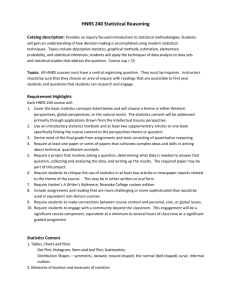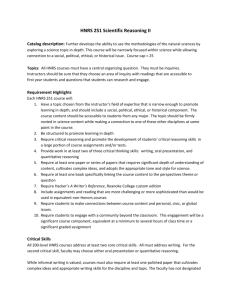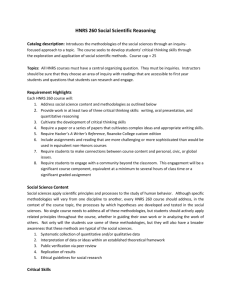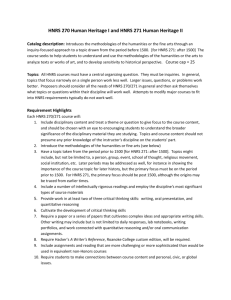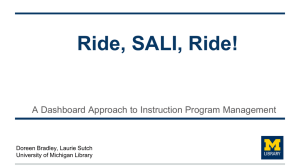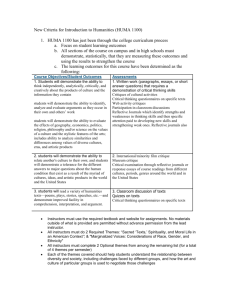HNRS 120 Guidelines
advertisement
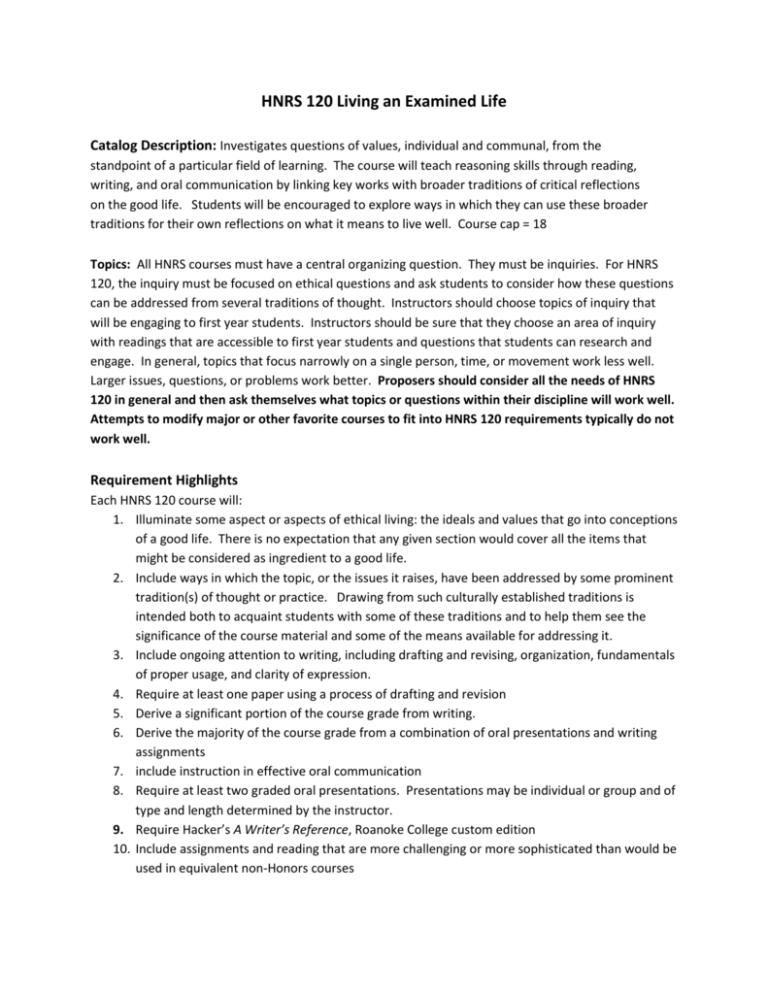
HNRS 120 Living an Examined Life Catalog Description: Investigates questions of values, individual and communal, from the standpoint of a particular field of learning. The course will teach reasoning skills through reading, writing, and oral communication by linking key works with broader traditions of critical reflections on the good life. Students will be encouraged to explore ways in which they can use these broader traditions for their own reflections on what it means to live well. Course cap = 18 Topics: All HNRS courses must have a central organizing question. They must be inquiries. For HNRS 120, the inquiry must be focused on ethical questions and ask students to consider how these questions can be addressed from several traditions of thought. Instructors should choose topics of inquiry that will be engaging to first year students. Instructors should be sure that they choose an area of inquiry with readings that are accessible to first year students and questions that students can research and engage. In general, topics that focus narrowly on a single person, time, or movement work less well. Larger issues, questions, or problems work better. Proposers should consider all the needs of HNRS 120 in general and then ask themselves what topics or questions within their discipline will work well. Attempts to modify major or other favorite courses to fit into HNRS 120 requirements typically do not work well. Requirement Highlights Each HNRS 120 course will: 1. Illuminate some aspect or aspects of ethical living: the ideals and values that go into conceptions of a good life. There is no expectation that any given section would cover all the items that might be considered as ingredient to a good life. 2. Include ways in which the topic, or the issues it raises, have been addressed by some prominent tradition(s) of thought or practice. Drawing from such culturally established traditions is intended both to acquaint students with some of these traditions and to help them see the significance of the course material and some of the means available for addressing it. 3. Include ongoing attention to writing, including drafting and revising, organization, fundamentals of proper usage, and clarity of expression. 4. Require at least one paper using a process of drafting and revision 5. Derive a significant portion of the course grade from writing. 6. Derive the majority of the course grade from a combination of oral presentations and writing assignments 7. include instruction in effective oral communication 8. Require at least two graded oral presentations. Presentations may be individual or group and of type and length determined by the instructor. 9. Require Hacker’s A Writer’s Reference, Roanoke College custom edition 10. Include assignments and reading that are more challenging or more sophisticated than would be used in equivalent non-Honors courses 11. Require students to make connections between course content and personal, civic, or global issues. 12. Require students to engage with a community beyond the classroom. This engagement will be a significant course component, equivalent at a minimum to several hours of class time or a significant graded assignment Tests and a final exam may be included if desired by the instructor, but are not required. Syllabus Checklist In addition to the elements above, the syllabus must include Instructor's office location and office hours Description of course content and teaching methods The learning outcomes for HNRS 120 as listed below. Instructors may, if they wish, include additional learning outcomes beyond the common set or may include some additional comments about how the common learning outcomes are realized in this specific course. Any materials that students are expected to buy, read, or use during the course Classroom and attendance policies (with penalties explained) Assignments students will be required to undertake Grading policy (ideally a grading scale with penalties explained) Testing policy, including make-up tests RC's academic integrity policy as it applies to the class An outline showing proposed topics, students' assignments, reading list, laboratory work, etc. to be required . Focus of inquiry Be sure that any boilerplate sections (e.g. tutoring, Writing Center) are applicable to the course and up to date. Learning Outcomes for HNRS 120—these must go on the syllabus. Instructors may add sectionspecific outcomes if desired. 1. Students will be able to formulate and evaluate arguments about ethical positions. 2. Students will be able to describe connections between the course topic and broader traditions of critical reflections on the good life. 3. Students will be able to give an effective oral presentation. 4. Students will be able to write a paper with a clear thesis, cogent argumentation, effective organization, and a minimum of sentence-level errors. 5. Students will connect course content to their lives and to communities beyond the classroom Assessment Requirements TBA Additional Notes DETAILS OF COURSE SCHEDULE AND ASSIGNMENTS Instructors will be asked to describe how this course satisfies all the requirements, and especially how the course satisfies those requirements that distinguish between INQ and HNRS courses. How much detail of the course schedule and assignments does an instructor need to include in a course proposal? Enough to allow the members of GEC and HonPAG to see that the course is meeting the requirements. The committees look at course schedules to see how much time is being spent on readings, how class time is being used, whether instruction in writing and oral communication is included, whether methodologies are being discussed, if sufficient time for drafting is allowed, and if sufficient time for oral presentations is allowed. Details of assignments can be very helpful to the committee especially in appreciating the use of inquiry or how drafting is being used. While few instructors will have fully detailed assignments sheets, providing some details of the assignment topic and focus helps the committees appreciate what the instructor is doing (with inquiry, methodologies, writing instruction, or other outcomes) and can help avoid a round of clarifying questions. . WRITING All HNRS courses must require at least one polished paper. Instructors are strongly encouraged to do more than simply assign writing by including techniques that can help students improve their writing and reasoning. Instructors should consider the use of drafts, peer review, workshops, and Writing Center visits. HNRS 120 requires attention to writing skills and process, including the use of drafts. No minimum page totals are specified. ORAL COMMUNICATION HNRS 120 requires instruction in oral presentation, not just assigning presentations. Make that instruction visible on the syllabus. Instructors may use either individual or group presentations. Class schedules should show the time allotted for presentations. Remember to multiply the length of presentations by the number of students, and then add some time to change between speakers to find the total time required. Instructors are encouraged to consider using techniques that will help students develop oral skills, such as requiring drafts of PowerPoint, or having class members critique presentations of their classmates. (This also helps keep audience members engaged while listening to their peers.) Instructors of HNRS 120 must include instruction in oral presentation skills and require at least two graded oral presentations. The course schedule should clearly show these components. Be sure to think through the consequences of timing of presentations. For example, do you want to sit through four days of student presentations at the end of the term, or do you want presentations dispersed across the term? HNRS 120 ETHICAL TRADITIONS As noted in its official course description, HNRS 120 requires connections of “key works with broader traditions of critical reflections on the good life. Students will be encouraged to explore ways in which they can use these broader traditions for their own reflections on what it means to live well.” Consequently, all sections must include ways in which the topic, or the issues it raises, has been addressed by some prominent tradition(s) of thought or practice. Drawing from such culturally established traditions is intended both to acquaint students with some of these traditions and to help them see the significance of the course material and some of the means available for addressing it.
